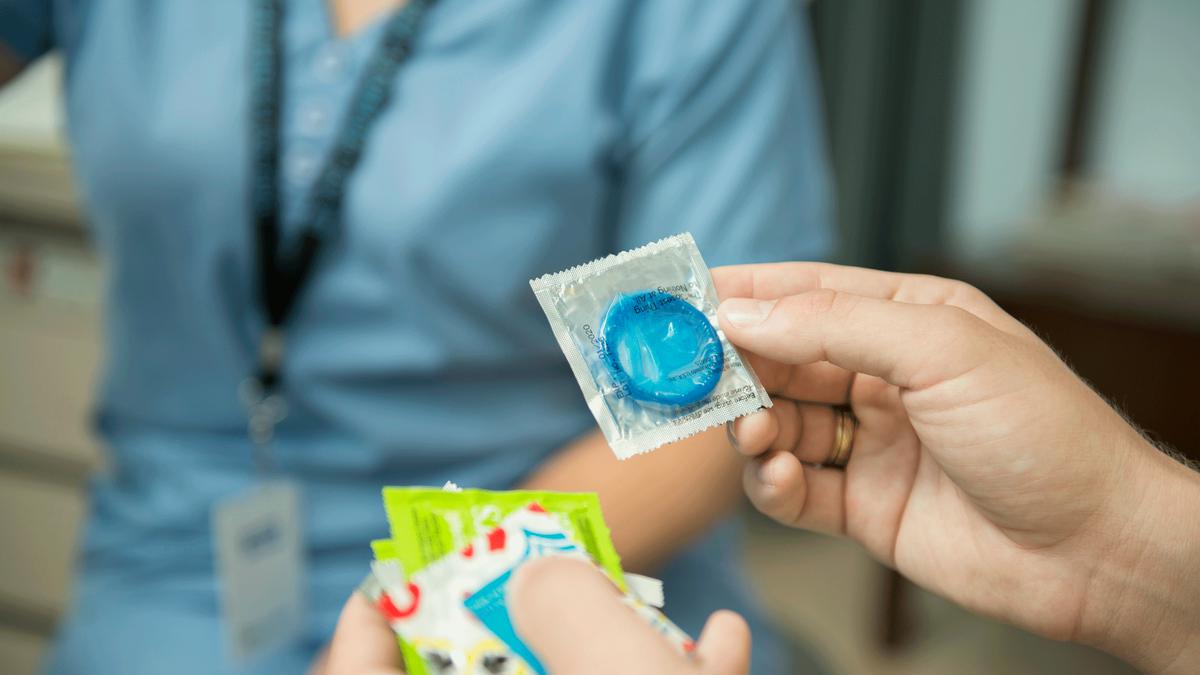Condoms are highly effective at preventing pregnancy and STIs, particularly when used alongside other methods such as the pill. This National Condom Week, we've got everything you need to use condoms safely — and to have fun while doing it!

National Condom Week: February 14–21
Why choose condoms?
There are lots of methods for birth control and preventing STIs. How can you tell if condoms are right for you?
- They're easy to use: With simple advice, it's easy to use a condom properly, and you can put it on immediately before sex, without any complex planning.
- They're accessible: External condoms are affordable and easy to buy at many stores — you can even get them for free at your local Planned Parenthood health center!
- They have few side effects: Condoms don't require any medical procedure, have no medical side effects, and with the right knowledge, don't result in less pleasurable sex.
- They're versatile: Condoms are effective in preventing preganancy and STIs, while some birth control options only address pregnancy.
- They're useful for many kinds of sex: Condoms protect against STIs during many sex acts, including vaginal, anal, and oral sex.
The Basics
Whether you're nervous about your first time, or a veteran of condom use, we have the information to help you make sure you're using condoms effectively.
How to Put On A Condom
Condoms are highly effective, as long as you use them correctly. Follow these tips to make sure you're getting the best protection when you or your partner puts on an external condom.
How To Talk About Having Safer Sex
Talking about safer sex with a partner can be awkward — we've got your back! Here are some tips on how to stay safe and make these conversations easy ... and sexy!
Condom Sense
External condoms are one of the best-known forms of protection, but there are a lot of misconceptions out there. We're here to the record straight!
Don't condoms break?
One common issue with condoms is obvious — they can break if used incorrectly. Fortunately, this is easily addressed. Be sure to follow our advice to put on a condom, including pinching the top to leave space for ejaculate, and using lube to reduce friction.
Condoms don't feel good!
We often hear complaints that condoms don't feel good to use. But that doesn't have to be the case! Using lube on both the inside and outside of a condom can greatly enhance your pleasure, and finding a condom that fits properly is a game changer. You can also explore condoms with special designs, such as ribbed or studded, to provide even more sensation.
Let's talk about sex!
We get it, sometimes it feels awkward to talk about protection, STIs, and other sexual topics. Talking with your partner is an important step in any relationship, especially if you're planning on having sex.
We're here to reassure you. You'll feel more comfortable (and have better sex!) if you brave the awkwardness and discuss protection with your partner. They may even thank you for taking the leap and beginning a conversation that they were worried about having!
What if I don't want to interrupt "the mood?"
If you're worried about awkwardness in the moment, have a conversation ahead of time. Talking about protection is also a great opportunity to discuss what sex acts you're interested in exploring together, which can help you have an even better time when you and your partner are aware of each others's needs and interests.
What if my partner doesn't want to use condoms?
Remember, consent is key. If you want to use a condom and your partner doesn't, you always have the option to choose not to have sex, or to explore other options for mutual pleasure that carry a lower risk of pregnancy or STI transmission.
Condoms and LGBTQ+ Sex
Condoms are often emphasized as a tool for straight couples to avoid pregnancy. But condoms are an important tool for many kinds of sex! If you or your partner have a penis, external condoms are highly effective at preventing STIs/STDs when you engage in oral, vaginal, or anal sex, or mutual masturbation. Even if you're confident you don't have an STI, you should still consider using a condom, since we don't always know with absolute certainty whether we've been exposed to an STI.
Condom Coloring Page!
To celebrate National Condom Week, we're releasing a new coloring page inspired by the wide variety of condom options. Take a look, have some fun, and relieve some stress ... either by coloring or by putting your condom knowledge to use!

Interested in going deeper?
Planned Parenthood offers a wealth of resources to learn more — including information about different kinds of condoms, other birth control methods, and options to protect yourself from STIs!
Book an Appointment
Or call 1-800-230-7526
